by Deanna K. Kreisel (Doctor Waffle Blog)
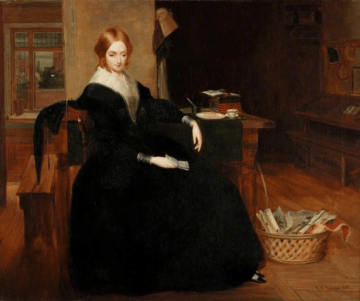 A little while ago my friend Bethany requested that I write an essay on the following topic: “Can/should pedantry be reconstituted as a virtue, maybe particularly for women.” I filed it away on my list of possible future essay ideas, but like a previous topic suggested by this same crafty, devilish friend, it got stuck in my brainpan and has been rattling around in there ever since. I’ve decided to fish it out and look at it, if only to stop the infernal racket.
A little while ago my friend Bethany requested that I write an essay on the following topic: “Can/should pedantry be reconstituted as a virtue, maybe particularly for women.” I filed it away on my list of possible future essay ideas, but like a previous topic suggested by this same crafty, devilish friend, it got stuck in my brainpan and has been rattling around in there ever since. I’ve decided to fish it out and look at it, if only to stop the infernal racket.
First of all, I have to confess that I already have a dog in this fight. I am definitely a pedant, and a pretty irritating one at that, so I have a vested interest in rehabilitating the practice of nattering on about arcane ephemera and correcting people’s grammar (unasked). It would be convenient for me if it suddenly became cool to know—and to trumpet one’s knowledge of—all the African capitals, say, or what an anusvāra in Sanskrit is, or what economic and political pressures led to the repeal of the Corn Laws in 1846.[1]
But then I started wondering: is it possible to be a pedant without being an asshole? I’m not sure I’m ready to sign up for the latter. The word “pedantic” is clearly pejorative; a pedant is defined as someone “who excessively reveres or parades academic learning or technical knowledge” (Oxford English Dictionary, a.k.a. The Pedant’s Bible). The word has been in use in English, essentially as an insult, since the late 16th century. When my friend asked me to consider reconstituting pedantry “as a virtue,” she clearly had this history in mind. Would it be possible to tease apart the erudition from the obnoxiousness implied in the word “pedantic”?
Or is it always in bad taste to display one’s knowledge and education? (Note that these perquisites do not require being rich or privileged—pedants, I think, are just as likely to be autodidacts as Oxbridge-educated snobs. Maybe more likely.) In other words, why is it such a bad thing to flaunt one’s learning? I can’t think of any analogous epithets for those who go around acting all athletic or beautiful. Sure, those people may also make us feel bad about ourselves, but we don’t blame them for just being themselves. Indeed, we often pay them lots of money to display their gifts before us while we eat popcorn and suck in our abs.
When we start looking (in true pedantic fashion) for literary role models,[2] we find only negative examples of pedantry. Middlemarch’s Mr. Casaubon, for example, is both the greatest literary pedant of all time and a complete asshole. Selfish and self-absorbed, manipulative and petulant, and focused only on his own grand intellectual project, he openly exploits his young wife Dorothea, forcing her to be his unpaid amanuensis with no regard for her separate personhood or sleep schedule. But elsewhere in the same novel we have several other pedantic characters, all of whom are arguably not assholes: first and foremost Doctor Lydgate, who is undertaking his own quixotic search for the “primitive tissue” that is the building block of all life; but less obviously Dorothea’s Uncle Brooke, a harmless prattling fool fond of “going into” a myriad of subjects; the mild-mannered Reverend Farebrother, obsessed with mollusks; and perhaps even the mansplainer Will Ladislaw, eager to push his way in the world, who (SPOILER ALERT) ends up marrying Dorothea after the death of Casaubon, and is thus the closest thing the novel has to a romantic hero.
Note that none of these characters is a woman. Mary Garth and her mother know a lot of stuff in a schoolmarmy kind of way, and Mrs. Cadwallader is an inveterate busybody, and even Dorothea herself has intellectual pretensions, but none of them gets to display actual erudition. Which is really freaking weird when you consider that the novel’s author, George Eliot, a.k.a. Mary Ann Evans and most definitely a woman, was arguably the most learned and erudite person in Great Britain in the nineteenth century. She was born into a middle-class-ish family (her father was the manager of an estate, which put him in a liminal position between the working classes and the gentry) and given a solidly respectable education at local girls’ schools, where she was clearly a total smarty-pants. Her formal education ended when she turned 16, however, and she was called home to care for her dying mother. For the next five years she acted as her father’s housekeeper, a position that at least gave her access to the huge library of Arbury Hall, where she could auto-didactify to her heart’s content. Her father also paid for music and language tutors for his teenage daughter, thereby giving her an education nearly unheard of for a young Victorian woman.
And she repaid that investment big-time. By the age of 26, she had published a translation of Strauss’s Das Leben Jesu kritisch bearbeitet (The Life of Jesus, Critically Examined), which caused a sensation by considering the life of Jesus from an historical perspective, scandalously arguing that the miracles in the New Testament were mythical. (Apparently the Earl of Shaftesbury at the time called her translation “the most pestilential book ever vomited out of the jaws of hell.”) By the age of 32 she had moved to London and was editing the left-wing journal The Westminster Review while hanging out with all the leading intellectual and literary lights of the period. After a series of aborted love affairs, she hooked up with theatrical-impresario-turned-marine-biologist[3] George Henry Lewes, who was trapped in a loveless marriage, and flouted all social conventions of the time by living with him for decades in a loving (and apparently pretty sexy) intellectual partnership. Along the way, she decided to start writing fiction, and promptly churned out several of the most influential and accomplished novels ever produced in the English language.
And yet, and yet. She could not imagine such a life for any of her heroines. Perhaps because her own intellectual journey was so utterly improbable, she figured it would strain credulity to depict anything like it in her fiction. Granted, her female protagonists all get to be smart, but none of them gets to have the glittering life of literary salons and worldwide recognition that she herself enjoyed. The heroine of her first novel, Adam Bede, is a Methodist preacher whose ministry ends when the church forbids women from preaching in 1803. Heroines of subsequent novels throw away their intellectual gifts on their husband’s stupid-ass editing projects (Middlemarch) and throw away their intellectual gifts in marriage to assholes (Romola, Daniel Deronda). Eliot’s only heroine who is anything at all like her—spunky, rebellious, smart AF, and a total little pedant[4]—is Maggie Tulliver of The Mill on the Floss. I cannot speak of her here, for my pen falters and my eyes are dimmed with tears. If you haven’t read that novel yet then for god’s sake do so immediately. What else are you doing with your life?
If Mary Ann Evans/George Eliot cannot depict for us a happy, attractive, emotionally and intellectually fulfilled female pedant, then who on earth can? It’s not like subsequent centuries are bristling with examples. Dorothy Sayers did bring us the sexycool Oxford-educated detective Harriet Vane in the 1930s, but she is one of pop culture’s very few examples of an attractive female pedant. While female sidekicks often get to be annoying know-it-alls (hello Velma), and they are instrumental to the resolution of many a plot or caper, their knowledge and intellectual accomplishments render them unfit for full heroinehood. Both Laura Holt and Veronica Mars had to hide behind male detective beards, and Buffy was bored by math. Meanwhile, Endeavour Morse, Gregory House, and even Benedict Cumberbatch’s Sherlock Holmes are thoroughly pedantic assholes who still get plenty of tail.
At one point while researching this essay, I decided to look up the Google Ngram Viewer statistics for the terms “pedantic” and “pedantic woman,” just to see what the overall usage trends have been for the past couple centuries. (Looking up terms on the Google Ngram Viewer is second only to looking up terms in the OED on the grand scale of pedantic activities.) Here is what we find for the generic term “pedantic”:
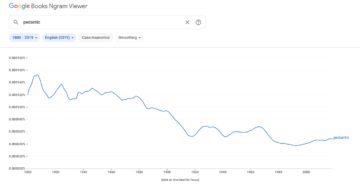
I suppose the overall downward trend is not surprising, if you subscribe to the theory that as a culture we are getting dumber and more anti-intellectual. However, given that “pedantic” is a negative term, then we might also read this graph as evidence that we’re growing more tolerant of showy erudition since we are insulting one another for it less. Either that, or fewer and fewer people know what “pedantic” means.
Here is the graph for “pedantic woman”:
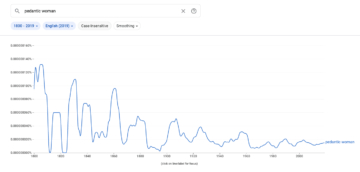
Now this is really all over the place, but the giant swoops become pretty meaningless when we notice the miniscule sample size in comparison with the word “pedantic.” Even though for centuries it was barely worth noticing pedantic women, when authors deigned to do so, they went in for the kill: “A pedantic woman is detestable; how much less to be borne with are such obsolete sentences of morals and stuff coming from the mouth of a Plebeian” (1800); “a pedantic woman is to me almost as disgusting as a silly woman” (1804); “a pedantic woman—the greatest curse upon earth” (1807); “I cannot endure either a masculine woman or a pedantic woman, and to possess these united qualities would render the most beautiful girl on earth odious in my eyes” (1859); “ a pedantic woman is a discord” (1926); etc. etc. etc.
But the real point of my including these usage trends is to share what I unearthed along the way. First of all, the completion prompts that Google produced when I typed “pedantic w—” into the search bar. Apparently the mere idea of a pedantic woman is, once again, simply beyond the purview of the average Google user:
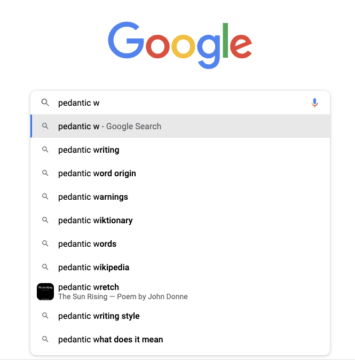
And secondly, most hilariously and confusingly, the results of a Google image search for “pedantic woman”:

I had been hoping to unearth a funky old woodcut of an 18th-century scold I could use as the main illustration for this essay, and instead…. I don’t even know what to do with these. If anyone has a theory, I would love to hear it.
I can’t remember how old I was when I figured out that my own pedantry rendered me unlovable, but it was probably (sigh) right around puberty. Up until the age of 13 or so, I was relatively untroubled by my utter lack of coolness (and up until I was around 9 or 10, by my utter lack of friends). By the age of three I had taught myself to read[5] and at age four was packed off to kindergarten, where I was systematically tortured by my classmates. Granted, I was an unpleasant brat a lot of the time. I scoffed at people (including adults) who didn’t know the meaning of a word I used, expressed incredulity at classmates who couldn’t read something I could, and crammed my everyday speech with SAT-level words (often mispronounced). My earliest memories of grade school are of standing at the bus stop with the hood of my parka bundled around my face in an attempt to drown out the sound of my classmates barking at me. The ringleaders, R.K. and R.Z.,[6]would also hurl what they thought were insults at my muffled head until the bus arrived. (“Brainiac!” “Nerd!” “Bookworm!” “Teacher’s pet!” Were these epithets supposed to hurt my feelings?)
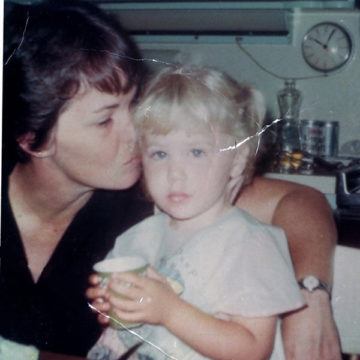
One of the kindest things my father ever did was to sit me down one day and tell me that I should never, ever act dumb in order to make friends. I think this was ultimately good advice, although it did delay my social development by a solid decade or so. Unfortunately, his intervention was undermined by the messages I received from my mother, who was deeply insecure about her own failure to finish college and liked to tell me that I had looked down on her from the moment I was born. In order to stave off the blistering insults and barbs from my (by the way, extremely intelligent) mom, I learned pretty quickly to dumb things down around her. It was a confusing mish-mash of conflicting signals, which I think makes me a pretty typical woman.
So let’s do it. Enough of the mish-mash! Let’s try to rehabilitate pedantry for female-identified people. Let’s not just tolerate it; let’s actually try to find it admirable, inspiring, and even attractive. Let’s celebrate women who are kind of assholes the way we do men who are really assholes. Let’s imagine a world in which Maggie Tulliver gets to edit an influential literary journal. Let’s make Maggiesplaining a thing! Let’s make “I have a plan for that” not just a political rallying cry but also a manifesto for female busybody know-it-alls the world over. Fellow female pedants, unite! You have nothing to lose but your eyeglass chains.
Vive la différance! Vivent les connardes!
[1] Of course, that repeal actually went into effect in 1849. (And that’s how it’s done!)
[2] And by “literary role models,” I almost always mean Victorian novels, particularly novels by George Eliot, particularly Middlemarch.
[3] This is just a thing one could do in the nineteenth century. “I am now a cellular biologist!” one could decide, of a morning. All it took was some basic education (which could be acquired in one’s spare time), some glass vials, and the leisure and income of a gentleman.
[4] A scene from early in the novel, when Maggie is a young girl visiting her brother Tom at school:
“I’ll help you now, Tom,” said Maggie, with a little air of patronizing consolation….
“You help me, you silly little thing!” said Tom, in such high spirits at this announcement that he quite enjoyed the idea of confounding Maggie by showing her a page of Euclid. “I should like to see you doing one of my lessons! Why, I learn Latin too! Girls never learn such things. They’re too silly.”
“I know what Latin is very well,” said Maggie, confidently, “Latin’s a language. There are Latin words in the Dictionary. There’s bonus, a gift.”
“Now, you’re just wrong there, Miss Maggie!” said Tom, secretly astonished. “You think you’re very wise! But ‘bonus’ means ‘good,’ as it happens,—bonus, bona, bonum.”
“Well, that’s no reason why it shouldn’t mean ‘gift,’” said Maggie, stoutly. “It may mean several things; almost every word does. There’s ‘lawn,’—it means the grass-plot, as well as the stuff pocket handkerchiefs are made of.”
“Well done, little ’un,” said Mr Tulliver, laughing, while Tom felt rather disgusted with Maggie’s knowingness.
[5] Apparently this is a thing! It’s called “Hyperlexia, Type III” and children blessed with this syndrome can also exhibit symptoms of autism that mysteriously disappear around age 10, which is exactly what happened with me.
[6] If you’re reading this essay, Roma Kohutiak or Rob Zajac, you can thank me for hiding your identities behind initials.
